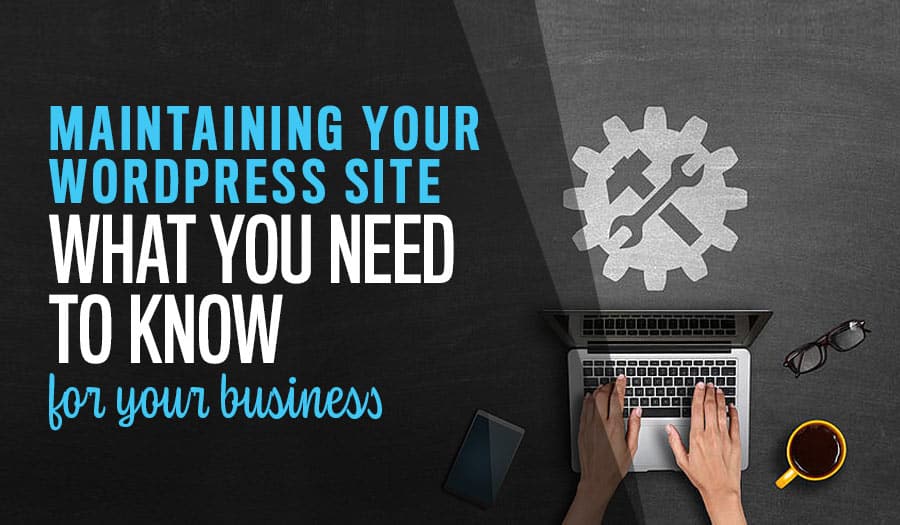WordPress can seem like one of the most straightforward and user-friendly platforms on the planet. Yet even a platform as intuitive as WordPress requires regular maintenance: backups to prevent potential data loss; updates to keep your site optimized; anti-spam software to guard against comment spam; security measures to guard against hacks; and various other best practices to keep your site as good as new. Here’s what you need to know about Maintaining Your WordPress Site.
Maintaining Your WordPress Site: What You Need to Know
Here is a quick overview of the basics:
Regular backups
Automated backups
Regular, automated backups are an essential part of every WordPress maintenance routine, and there are a wide variety of options available. Often you can set up automated backups through your host. However, WordPress also has several excellent backup plugins for you to choose from. Here are some of the most popular:
It’s actually a good idea to set up several automatic backup systems, as long as they don’t conflict. This way if one of them fails, the others will have you covered. Moreover, you’ll want to be absolutely certain that you’re backing up to several locations, not just the server running your WordPress site. After all, if your backup files are on the server, and something catastrophic happens on the server, you will lose both your site and your site backups.
Backup more than your database
Be sure your backup systems are backing up not only your database but any files (such as those found in your uploads folder) that you will need to perform a complete restore without any gaps whatsoever.
Test your backups
Site owners often assume that as long as they have their site backed up, they have nothing to worry about if it crashes. But this is not the case. Backup files are not always perfect and can sometimes fail altogether. And if something goes wrong with an untested backup file, it can be as bad as having no backup at all. So, test your backups, but not on your live site. Test them on a test site, whether local or not, that is identical to your live site.
Updates
Plugin and theme updates
Depending on your situation and settings, your plugin and theme updates may take place automatically. But there are exceptions, so it’s important to know how to update your plugins and themes manually when necessary. Thankfully, it’s relatively straightforward. See instructions on WordPress.org.
Remember: don’t update all your plugins at once. There could be a conflict and you might not know which one is at fault. So update your plugins one at a time, testing your site after each update before going to the next.
Major WordPress upgrades
Small WordPress updates are much like plugin and theme updates and—depending on your settings—may take care of themselves automatically. However, you’ll still need to take care of major WordPress upgrades. These carry more risk than theme and plugin updates, so you’ll want to handle them carefully. See instructions on WordPress.org.
Anti-spam software
Unless you decide to disable comments altogether, you’re going to need an anti-spam strategy. Millions of WordPress site owners rely on the Akismet plugin for this purpose.
Security
Check with your WordPress host to see what kind of security measures they have in place. Also, be sure to take a good look at WordPress security plugins. The most popular at the time of this post is Wordfence, but there are many others, and it’s always a good idea to do your research.
General best practices
In addition to the list above, don’t forget to monitor your WordPress site’s vitals and traffic patterns (you might try the Google Analytics plugin); perform regular checkups on the health of your database; document any significant changes you make to your site; and stay on top of any important WordPress-related news.
To learn more best practices for maintaining a healthy, secure, bug-free WordPress site, contact us.
Let Sydney’s leading Web Design Agency take your business to the next level with a Pixel Fish Small Business Website.
Check out some of our latest Website Design projects and Testimonials.
Further Information:
Top 10 Tips to Create The Perfect Website Call to Action
Tips for Creating and Marketing a Financial Services Business Website
Top 10 Unbeatable WordPress Website UX Tips for your business
How to Drive Website Traffic with Podcasting for your business
Digital Branding: How to Create a Logo for your Digital Space
Top E-Commerce Shipping Options to Maximise Sales & Reduce Complexity
10 Social Media Publishing Tools To Streamline Your Content Marketing
The 8 Best Free Online Photoshop Alternatives



